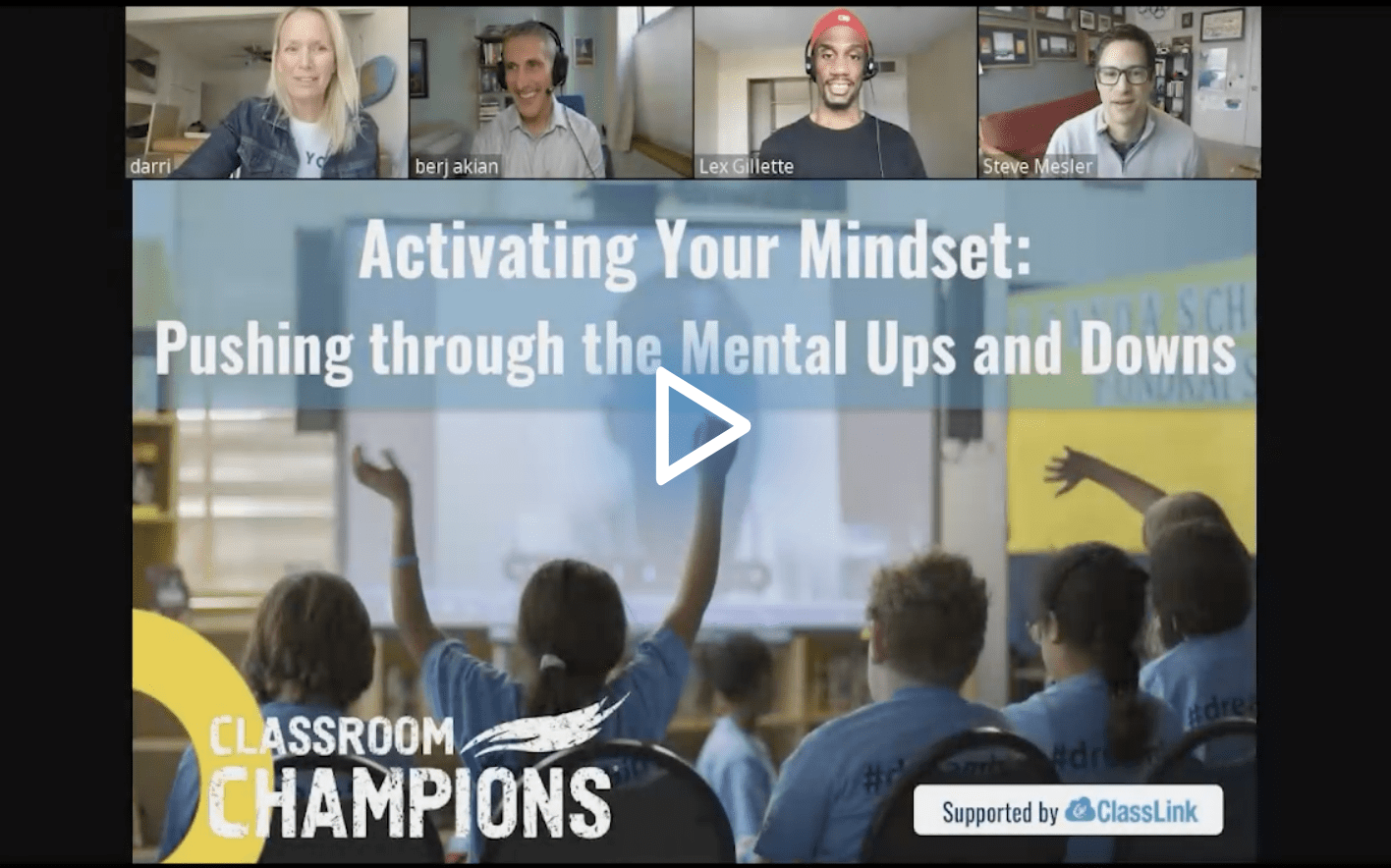Control What You Can with a Positive Mindset
Watch the Recording Listen to the Podcast
Lex Gillette, a 4x Paralympic silver medalist, was hyperexcited about making his mom’s mac and cheese, a meal he grew up with. He called her one weekend to walk him through each recipe step. But just before finishing up the last one, he realized that his favorite dish wasn’t going to be like his mom’s. He had messed up, he believed. And it bummed him out.
Gillette is no stranger to setbacks. Drawing on the resilience he’s honed as a competitive track and field athlete, he finished cooking to see where the meal might land. Maybe, he thought, he could salvage some of that nostalgic mac and cheese.
It’s that type of positive thinking that frames Gillette’s attitude in general, he explained in the edLeader Panel, “Pushing Through the Mental Ups and Downs with Paralympic Medalist Lex Gillette.” He shared the actions he takes to maintain his social-emotional health, forge ahead, and overcome obstacles—strategies he promotes among students and teachers as a Classroom Champions mentor.
When Things Get Rough: What to Do?
It happens all the time: Things are acting on us we can’t control. External challenges and circumstances can bring us down. They overwhelm us, demanding self-awareness and self-management to move forward.
Gillette likens these situations to a washing machine’s spin cycle. “They put you in the space where you might feel anxious. You might feel like you’re spinning a bit.” He emphasized that focusing on what you can control internally with the right tools and mindset enables you to step out of the spin cycle.
These aren’t just words of wisdom from Gillette. He regularly practices forward movement in sports and beyond.
To channel positive energy and drive, he stays focused, thinking about the prep and practice he’s done to accomplish his long-jump goals (things he wants to conquer). He remains focused on those goals, visualizing where he wants to be and controlling internally what he needs to get there.
When he’s not as successful as he had hoped (he recalls one world championship where he didn’t make the finals), he reminds himself that a single event is not the end of his success. There will be other opportunities to learn from his mistakes and perform better next time.
Most important for Gillette is to recognize his humanity. Like all people, he has days when he struggles to achieve and must push himself through low moments of motivation.
Not Just for Athletes
Gillette’s approaches to social-emotional health are not just for athletes; everyone can use them to navigate life’s ups and downs and maintain a can-do attitude.
These strategies, which Gillette adapts and promotes as a Classroom Champions mentor, are beneficial to students and teachers who are meeting daily various demands that can affect mental health and overall well-being.
Building on what has worked for him, he recommends the following for boosting morale, taking on challenges, and achieving success in school and beyond:
- Set goals and map out ways to achieve them. If a student is struggling with math, the long-term goal could be to pass the math exam at the end of the year. Short-term goals could include setting aside time to study each day, meeting with the teacher twice a week for extra help, etc.
- Center on gold-medal days when you prepared for something and did it well. For students, that could be remembering their success on assignments and recognizing that they are fully prepared for the test. They did the work; now, they need to execute their knowledge.
- Stay focused mentally to reach your destination. If there is something to achieve each day, center your vision on that goal, which can alleviate some anxiety. Use your mental muscles to push through any obstacles. This approach can guide your actions daily.
- Recognize that success requires sacrifices at times. Passing a test means buckling down to study—not hanging out late with friends—to get solid review time.
- Always build on accomplishments by continuing to move forward. Whenever you can do better, find a way to do that. Focus on progress. Accept “failing forward” to reach that higher achievement level.
- Persevere!
- Have trust in yourself and your abilities, and in those who can support your growth and success.
Social-emotional learning is a lifelong professional and personal journey that ebbs and flows. It’s essential to grow the skills and attitudes that make one stronger, able to handle challenges, and accomplish goals.
Gillette offers this advice to follow along the journey:
“Scan the landscape and make sure that you’re covering all your bases and doing everything you need to do so that you can get out there and put your best foot forward.” And to always keep moving forward with a confident gaze that says, “All right, I’m always going to find a way to do better because life is about progress.”
Learn more about this edWeb broadcast, “Pushing Through the Mental Ups and Downs with Paralympic Medalist Lex Gillette,” hosted by Classroom Champions and sponsored by ClassLink.
Watch the Recording Listen to the Podcast
Join the Community
School Health & Safety is a free professional learning community that provides educators, school staff, school leaders, and district administrators with a forum to collaborate and discuss the issues and practices that can keep schools, students, and staff healthy and safe.

ClassLink empowers your students and teachers with instant access to their learning resources. ClassLink® OneClick® includes a library of over 5,000 single sign-on apps and instant links to file folders at school and on Google, Office 365, and Dropbox cloud drives. ClassLink Roster Server easily and securely delivers class rosters to any publisher using open technology standards. ClassLink Analytics gives decision makers the usage data they need. Accessible from any computer, tablet or smartphone, ClassLink is ideal for 1to1 and Bring Your Own Device (BYOD) initiatives.
Blog post by Michele Israel, based on this edLeader Panel.







Comments are closed.